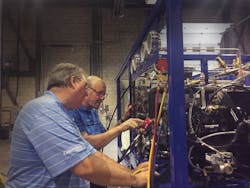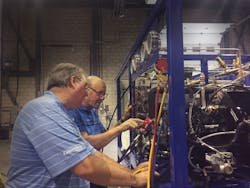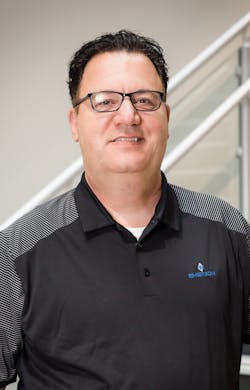Carbon Dioxide Refrigeration Training Gets Due Attention
According to industry estimates that forecast the use of natural refrigerants over the next few years, adoption of CO2 (refrigerant name R-744) is expected to increase significantly in U.S. commercial refrigeration applications. Driven by a combination of emerging regulatory mandates and corporate sustainability objectives, supermarket operators are actively evaluating this globally proven refrigerant alternative. Although CO2 has zero ozone depletion potential (ODP) and a global warming potential (GWP) of 1 — and is approved for use by the Environmental Protection Agency (EPA) — much of the U.S. food retail industry is still apprehensive about adopting it for widespread commercial deployment due to a few of its refrigerant characteristics.
Installing, commissioning and maintaining CO2 refrigeration systems throughout the system lifecycle requires the expertise of certified service technicians. Unfortunately, not all service technicians and store operators are yet fully comfortable with the unique properties of CO2 and need more training and experience working with CO2.
Anticipated increases in CO2 adoption also come at a time when our industry faces a growing technician shortage. Operators who are planning on making this transition to CO2 are rightfully concerned about the scarcity of contractors qualified to service their CO2 systems.
To overcome these apprehensions and ensure the effective implementation of CO2 refrigeration systems, our industry has an urgent need for the development ofCO2 refrigerant characteristics
Compared to traditional hydrofluorocarbon (HFC) refrigerants, CO2 has many unique performance characteristics, some of which must be managed in different ways than traditional refrigerants:
- Higher saturation pressure than HFCs (a CO2 refrigerant tank sitting at a 70 F ambient will have an internal pressure of 838 psig)
- Higher discharge pressures (up to 1,500 psig on a hot summer day)
- Standstill pressures, which refers to the pressure in each section of the system when it is powered off
- Pressure relief valves are required in every section of the system operating at different pressures as a mitigation strategy during service and power outages
- Lower critical point (1,056 psig, 87.8 F) determines its modes of operation:
- Subcritical operation exists below critical point (gas cooler is controlled by sub-cooling setpoint)
- Transcritical operation exists above critical point (gas cooler is controlled by optimizing COP)
- High triple point (61 psig) introduces the potential for dry ice formation (technicians must charge with vapor until equalized system pressures are well over 61 psig — preferably over 100 psig — before starting to charge with liquid)
- Higher relative density versus air (1.52) requires leak detection sensors located approximate 18-in. off the ground.
Reliance on electronic controls
Unlike traditional centralized direct expansion (DX) systems using HFCs, CO2 systems require the use of electronic controls to:
- Automate aspects of system installation, setup and commissioning
- Integrate with cases and electronic expansion valves (EEVs)
- Manage dynamic system pressures during normal operation.
Many technicians are not accustomed to relying on system controls to this degree. Understanding how these controls may impact servicing requirements and system performance is essential. Technicians will require hands-on experience and classroom training to familiarize themselves with CO2’s unique characteristics.
Industry collaborates on CO2 training materials
Emerson is currently participating in efforts to help third-party industry organizations develop CO2-specific training programs for the entire commercial refrigeration supply chain of wholesalers/distributors, OEMs, end users and service technicians.
The North American Sustainable Refrigeration Council (NASRC) is a 501(c)3 nonprofit focused on addressing barriers to natural refrigerant adoption. In collaboration with the ESCO Group and other industry stakeholders, the NASRC is leading the development of the first-ever CO2 curriculum for community college and trade school HVACR programs in the U.S.
As an industry steward of CO2 adoption and a provider of fully integrated CO2 refrigeration solutions — including compressors, facility management system controller, valves, case controls and associated components — Emerson is pleased to participate in this effort. According to Morgan Smith, program and communications director at the NASRC, the new CO2 curriculum will be rolled out in early 2022 and cover a wide range of topics, including:
- Basic terms and definitions of CO2 characteristics and systems
- CO2 safety fundamentals, such as: handling, tools and gauges, relief requirements, leak rates and room sensors
- Core curriculum, including: required experience; understanding CO2 as a refrigerant; operating characteristics; types of CO2 systems; working with non-traditional system components, compressor types, control systems and equipment applications
- Installation procedures: handling CO2 as a refrigerant; installation fundamentals and piping insulation
- System commissioning procedures
- Service and maintenance procedures, such as: system charging and discharging; repairing and replacing components; CO2 oil management; CO2 system recovery; defrost methods and custom systems
- Troubleshooting.
Smith said that the goal of the collaboration is to integrate this CO2 curriculum into the commercial refrigeration tracks at technical colleges.
“Because CO2 is so new to the U.S. commercial refrigeration market, technicians and end users have varying degrees of hesitation. We hope these training programs will help remove some of the mystery and concerns about using this efficient and environmentally friendly natural refrigerant,” she said.
CO2 training programs and initiatives
Emerson continues to expand on its CO2-specfic training initiatives. In 2019, we launched our third-generation CO2 mobile training unit to serve Canada and the continental U.S.; it has trained more than 1,000 industry professionals in North America. However, with the onset of the COVID-19 pandemic, this unit has remained a stationary fixture within Emerson’s training facility in Brantford, Ontario.
In 2022, a second CO2 mobile training unit will be housed at Emerson Educational Services’ primary location in Sidney, Ohio. Once there, it will become the centerpiece of a two-day training program designed to give contractors, OEMs, wholesalers and end users a hands-on experience of what it’s like to work on a CO2 transcritical booster refrigeration system.
Emerson CO2 trainers provide an open 360-degree view of a CO2 transcritical booster system. Emerson’s CO2 trainers are designed to give attendees firsthand CO2 experience and familiarize themselves with key system elements, including:
- Low- (LT) and medium-temperature (MT) compressors
- Variable-frequency drives (VFDs) for compressors
- Oil management systems
- Facility management system and CO2 refrigeration controls
- System high-pressure control and valves
- Case controls and electronic expansion valves
The open design of the CO2 mobile trainer enables visibility to all components and dial gauges that indicate the pressures and temperatures at various points of the system.
To demonstrate the volatility of R-744, the unit includes a phase change cell that shows how the refrigerant changes states as pressures increase — from liquid to vapor to supercritical fluid to gas. Then, as pressure drops within the cell, trainees can see the reverse of this transition as CO2 returns to a liquid state and then forms into dry ice. Emerson is scheduling CO2 training classes to begin in Q1 of 2022.
Emerson Educational Services currently offers two virtual and in-person training courses related to CO2:
- Two-day “CO2 Refrigeration” course specifically designed to train technicians
- One-day course entitled, “Fit for the Future: Working with Natural Refrigerants, A2Ls, and A1 HFO Blends”
As COVID-related health guidelines permit, we hope to send our CO2 mobile training units back on the road to be featured at industry events and support training sessions.
To learn more about the CO2 training programs at Emerson, visit the course schedule here, or contact Emerson Educational Services at [email protected].
Don Gillis joined Emerson in July of 2017. Don has 27 years of HVACR industry experience, including roles as an installer, service technician, service manager, technical support, and full-time HVACR instructor.
About the Author
Don Gillis
Lead Technical Trainer
Don Gillis joined Emerson in July of 2017. Don has 27 years of HVACR industry experience, including roles as an installer, service technician, service manager, technical support, and full-time HVACR instructor.
Don has served on the Heating Advisory Board for Ivy Tech Community College and has been a guest speaker at HVACR industry events, such as the HVACR Educators and Trainers Conference, RSES Conference, and HVACR Technology Expo. Don has also been quoted in several national trade magazines and has served as a judge for the SkillsUSA National Championship for the last two years.Don attended Vantage Vocational School, the University of Toledo, and Ivy Tech Community College. His industry recognized credentials include being BPI certified, a licensed HVAC journeyman, a RSES member, as well as having EPA 608 certification, and OSHA supervisor certifications.


